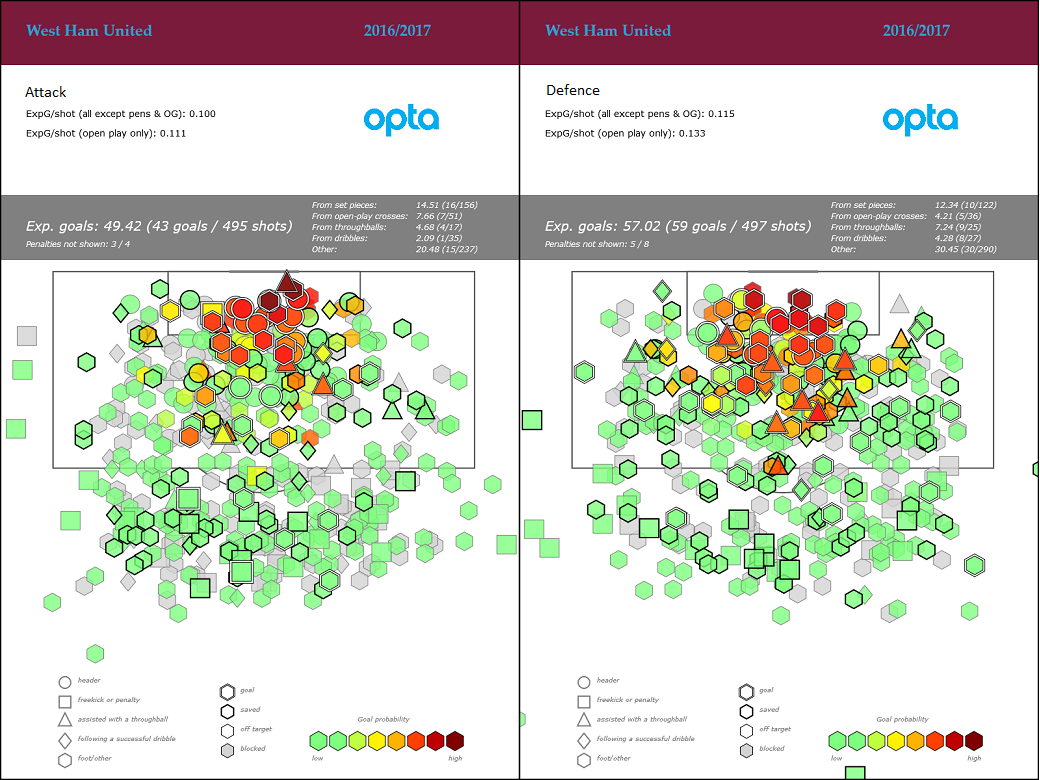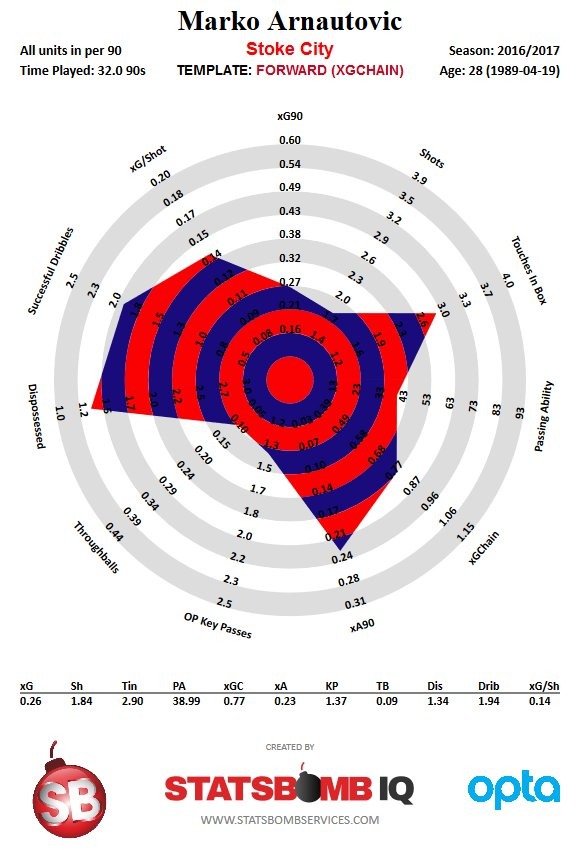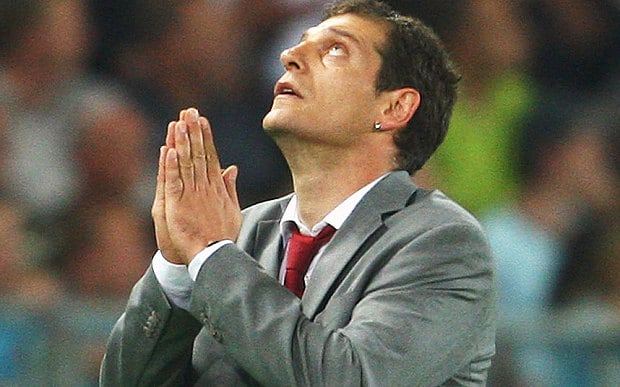2016-17 was a rough year for West Ham. Besides the obvious saga that was Dimitri Payet wanting to return to Marseille, the club on the pitch significantly dropped back from the previous season. Some of this could’ve been predicted: The idea of turning games into high event ordeals that more resembled basketball just seemed off base as a sustainable blueprint. Factor in that West Ham had an expected goal difference much closer to 0 than the +14 accumulated in 2015-16, and last season was always going to be a step back, but perhaps it was an even bigger one than could’ve been imagined. The product on the pitch was often not great, and Slaven Bilic’s shine wore off considerably as a result. We’re in year two of the Olympic Stadium era; a.k.a. “We somehow got a brand spanking new stadium for dirt cheap”, so there's the interesting question of how much the new home will feel like home but after the disappointment of last season, the club has spent big to regroup for 2017-18. The manager likely needs a good season with a view to retaining his job. Will it pay off as intended? Reversion to the Mean West Ham in 2015-16 were a perfectly okay team that overachieved, with metrics indicating they should’ve been closer to 10th than 7th. They got the benefits of Dimitri Payet scoring numerous amounts of goals from audacious free kicks, and Michael Antonio scoring on a high volume of headers (which to be fair he also did a year later). Only Leicester City had a better goals/shot on target conversion rate in attack, and they banked a lot of points from the beginning third of the season when everything they touched practically flew into the opposition’s net. West Ham in 2016-17 were a below average side that got far fewer breaks than the season before and that combination made them suffer. It didn’t help that they spent a considerable amount of time in a losing position, finishing in the bottom ten in time spent in that game state. The leaky defense that got covered over previously continued to allow chances. Only Liverpool and Swansea gave up a greater percentage of shots as big chances, and only Swansea and Hull conceded more big chances in general. Combine that with a less formidable attack and it paints a bad picture:  It isn’t unreasonable to think that West Ham could return to being what they were in 2015-16 but perhaps without the conversion luck they received. There’s enough credible attacking talent in the 27-29 age range, and perhaps enough of them to have prime caliber seasons at the same time. Andre Ayew quietly had a nice debut season, with a 0.56 NPGA per 90 rate in just 1411 minutes due to his early season injury. Another season of sub 65% save rate from their goalkeepers would be a problem though and the Olympic Stadium could end up as home to high amounts of entertaining 2-2/3-2 types of encounters. Transfers and Lack of Strategy West Ham transfer strategy is has been hard to fathom for quite some time now. You can look at some of the players they’ve been linked to over the past couple of summers and think that if this is what they were intending to do, they were on the right track: Alexandre Lacazette, Rachid Ghezzal, Kelechi Iheanacho, Michy Batshuayi. All those players at the respective prices they were listed at would’ve been fine value. They could even claim to have gotten one of the better value in the league over the past two or so years when they signed Dimitri Payet for around £11M in the summer of 2015, and he proceeded to have a very good, albeit short, tenure at the club before the messy divorce. Hell, even if you look at this summer’s moves in isolation, they’re not *that* bad. Javier Hernandez is a professional goal scorer who’s averaged 0.60 non-penalty goals per 90 over the past four seasons. He’s damn good at what he does, and West Ham fans are probably overjoyed at having an actual proper striker to lead the line considering who’s manned that position over the years. Meanwhile Marko Arnautovic on middling Stoke sides has been a consistent attacker. He’s was one of the few redeeming parts on what was a lost season for the club in 2016-17, and he’s arguably the best hope for replicating the kind of production that Payet brought to the club from that left sided position:
It isn’t unreasonable to think that West Ham could return to being what they were in 2015-16 but perhaps without the conversion luck they received. There’s enough credible attacking talent in the 27-29 age range, and perhaps enough of them to have prime caliber seasons at the same time. Andre Ayew quietly had a nice debut season, with a 0.56 NPGA per 90 rate in just 1411 minutes due to his early season injury. Another season of sub 65% save rate from their goalkeepers would be a problem though and the Olympic Stadium could end up as home to high amounts of entertaining 2-2/3-2 types of encounters. Transfers and Lack of Strategy West Ham transfer strategy is has been hard to fathom for quite some time now. You can look at some of the players they’ve been linked to over the past couple of summers and think that if this is what they were intending to do, they were on the right track: Alexandre Lacazette, Rachid Ghezzal, Kelechi Iheanacho, Michy Batshuayi. All those players at the respective prices they were listed at would’ve been fine value. They could even claim to have gotten one of the better value in the league over the past two or so years when they signed Dimitri Payet for around £11M in the summer of 2015, and he proceeded to have a very good, albeit short, tenure at the club before the messy divorce. Hell, even if you look at this summer’s moves in isolation, they’re not *that* bad. Javier Hernandez is a professional goal scorer who’s averaged 0.60 non-penalty goals per 90 over the past four seasons. He’s damn good at what he does, and West Ham fans are probably overjoyed at having an actual proper striker to lead the line considering who’s manned that position over the years. Meanwhile Marko Arnautovic on middling Stoke sides has been a consistent attacker. He’s was one of the few redeeming parts on what was a lost season for the club in 2016-17, and he’s arguably the best hope for replicating the kind of production that Payet brought to the club from that left sided position:  That’s probably where the positivity ends. Joe Hart has been in decline over time and beyond not being a stylistic fit at Man City, his year in Italy was erratic at best. Thankfully he’s only on a one year loan, but it looks like Adrian has got a rough deal as he has been one of the best shot stoppers in the league over time even with his poor 16-17 campaign and there’s not much of an argument to be made that Joe Hart should start over him. Meanwhile Pablo Zabaleta is a 32-year-old fullback in a young man’s position, and he’s signed on until age 34. It’s hard to understand how that could be considered a good thing. At best Zabaleta doesn’t move the needle in the negative direction and represents a net zero. Even Arnautovic, while providing considerably more present value than the other two, is now on the books until age 33. Chicharito only being a two-year deal is arguably the redeeming quality deal wise of what’s happened this summer. West Ham aren’t a selling club. You might think that would represent a good thing, but rather it's got to do with them almost never having anyone good to sell. Dimitri Payet and James Tomkins represent the only two players that West Ham have sold for at least £10M since Carlos Tevez in 2009. Just look at the amount of 30 and over players that will be on contract for 2018-19: Zabaleta (34), Jose Fonte (35), Robert Snodgrass (31), Mark Noble (32), Andy Carroll (30), Winston Reid (31), Angelo Ogbonna (31), Hernandez (31) and Arnautovic (30). It’s such a huge chunk of the wage bill allocated to players who are firmly on the wrong end of the age curve, even if PL teams have more money in 2017 than Scrooge McDuck. It’s no wonder West Ham almost always run at a player trading deficit year in and year out and the big issue is how short-sighted it all is. Compare what’s happened to West Ham since 2012-13 with a team like Southampton, and the lack of a process gets even more damning. Southampton haven’t been perfect over the same time span, but they’ve been able to constantly sell players that bigger clubs have coveted, and while constantly outperforming West Ham both in points and underlying metrics. In comparison, West Ham just don’t seem to be a club with much of a long-term plan or structure in place, which considering the decent resources they have is a bit of a shame. Outlook I get what West Ham are trying to do in the short term, and I understand the sentiment on some level: get some recognizable names, finish in the top ten, entertain and worry about next summer when it arrives. Had Arnautovic’s contract been 2-3 years and Zabaleta a one-year deal, I’d be more inclined to cut them some slack on their short-term idea. I still wonder how Chicharito is going to be fed the ball in his sweet spot on a consistent basis with the roster construction as is, but there’s not too much that can be quibbled about with his transfer in relation to the other ones. As for 2017-18? If a heck of a lot of things go right, finishing 7th isn’t that unreasonable but more likely they land bang in the middle somewhere. They’re part of the group featuring Everton, Leicester, and Southampton that are likely to vie for a finish atop of the “best of the rest” table (Stoke lost their membership privileges after their last 12 months of performance). Different betting places have West Ham’s Over/Under point total at around 46-47 points, and you could definitely see the team get to the low-mid 50’s if enough things go right for them. It very much feels like West Ham are treading water as a club, but at least this season promises to be less dysfunctional than 2016-17 ultimately became.
That’s probably where the positivity ends. Joe Hart has been in decline over time and beyond not being a stylistic fit at Man City, his year in Italy was erratic at best. Thankfully he’s only on a one year loan, but it looks like Adrian has got a rough deal as he has been one of the best shot stoppers in the league over time even with his poor 16-17 campaign and there’s not much of an argument to be made that Joe Hart should start over him. Meanwhile Pablo Zabaleta is a 32-year-old fullback in a young man’s position, and he’s signed on until age 34. It’s hard to understand how that could be considered a good thing. At best Zabaleta doesn’t move the needle in the negative direction and represents a net zero. Even Arnautovic, while providing considerably more present value than the other two, is now on the books until age 33. Chicharito only being a two-year deal is arguably the redeeming quality deal wise of what’s happened this summer. West Ham aren’t a selling club. You might think that would represent a good thing, but rather it's got to do with them almost never having anyone good to sell. Dimitri Payet and James Tomkins represent the only two players that West Ham have sold for at least £10M since Carlos Tevez in 2009. Just look at the amount of 30 and over players that will be on contract for 2018-19: Zabaleta (34), Jose Fonte (35), Robert Snodgrass (31), Mark Noble (32), Andy Carroll (30), Winston Reid (31), Angelo Ogbonna (31), Hernandez (31) and Arnautovic (30). It’s such a huge chunk of the wage bill allocated to players who are firmly on the wrong end of the age curve, even if PL teams have more money in 2017 than Scrooge McDuck. It’s no wonder West Ham almost always run at a player trading deficit year in and year out and the big issue is how short-sighted it all is. Compare what’s happened to West Ham since 2012-13 with a team like Southampton, and the lack of a process gets even more damning. Southampton haven’t been perfect over the same time span, but they’ve been able to constantly sell players that bigger clubs have coveted, and while constantly outperforming West Ham both in points and underlying metrics. In comparison, West Ham just don’t seem to be a club with much of a long-term plan or structure in place, which considering the decent resources they have is a bit of a shame. Outlook I get what West Ham are trying to do in the short term, and I understand the sentiment on some level: get some recognizable names, finish in the top ten, entertain and worry about next summer when it arrives. Had Arnautovic’s contract been 2-3 years and Zabaleta a one-year deal, I’d be more inclined to cut them some slack on their short-term idea. I still wonder how Chicharito is going to be fed the ball in his sweet spot on a consistent basis with the roster construction as is, but there’s not too much that can be quibbled about with his transfer in relation to the other ones. As for 2017-18? If a heck of a lot of things go right, finishing 7th isn’t that unreasonable but more likely they land bang in the middle somewhere. They’re part of the group featuring Everton, Leicester, and Southampton that are likely to vie for a finish atop of the “best of the rest” table (Stoke lost their membership privileges after their last 12 months of performance). Different betting places have West Ham’s Over/Under point total at around 46-47 points, and you could definitely see the team get to the low-mid 50’s if enough things go right for them. It very much feels like West Ham are treading water as a club, but at least this season promises to be less dysfunctional than 2016-17 ultimately became.
2017
West Ham 2017-18 Season Preview
By admin
|
August 10, 2017
